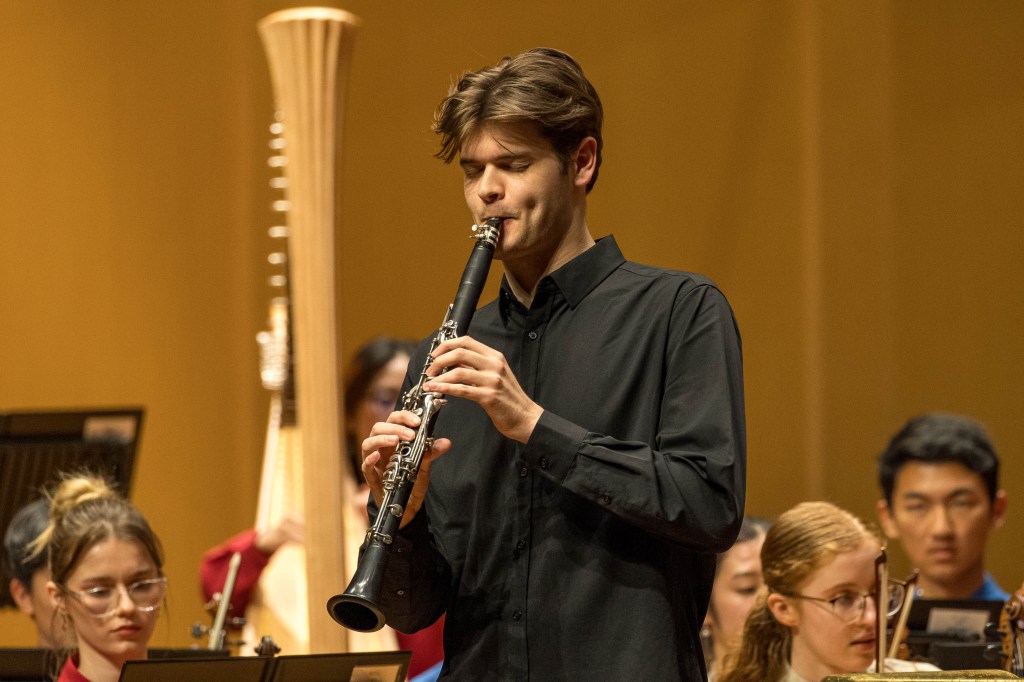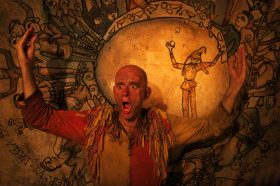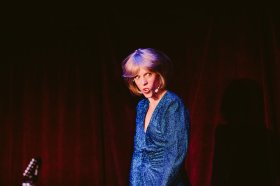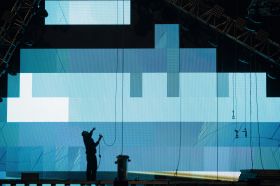Simon Hewett is just two and a half years into his tenure as Artistic Director of the Queensland Youth Orchestras (QYO). In such a short time, he has already demonstrated an impressive ability to both nurture and lead the young players of its key orchestra, the Queensland Youth Symphony (QYS), while also programming works that ably stretch and challenge the musicians.
This time last year, he conducted an extraordinary orchestrally-mature performance of Mahler’s Symphony No.3. Earlier in 2023, we were treated to Earth Fire Water, a concert of richly coloured impressionistic music that was as slick and polished a performance as one could hope for.
And now he has done it again with a program enticingly called Romance. His chosen works are not from a traditional earlier period of romantic music; rather they have come from 20th century composers. And there is a clear thread, not only linking the musical choices and their compositions, but also within the stylistically different pieces and the challenges such a program presents.
Hewett commenced with one of the most romantic of composers, Ravel, choosing the famous Daphnis et Chloé, Suite No. 2 from his ballet of the same name, with its beautifully colourful instrumentation designed for large-scale orchestral forces. The marvellous opening movement, ‘Lever du jour’, commences with whisper-fine shimmering harps, the twitter of birds from the woodwind and sweeping melodic arpeggios from the strings and horns, as the world wakes to a new dawn. It was evocatively and sensitively played with warm musical colours, while increasing sonority from the brass evoked the sea seemingly swelling and ebbing.
The second movement, ‘Pantomime’, is a joyous stylised dance between the two principal characters, Daphnis and Chloé. These were ably represented in the woodwind with a finely crafted virtuosic solo by Principal Flautist, Braden Simm, and excellent work from clarinets, oboes, bassoons and horns. The third ‘Danse générale’ movement, a fast and frenzied celebratory dance, offered powerful brass, percussion and the darker strings of the celli and double basses. It was superbly managed by Hewett with excellent playing from the entire orchestra.
Aaron Copland, generally considered the greatest of US composers, was next on the program. His Clarinet Concerto is in many ways a quirky piece of composition, commissioned by the legendary jazz musician and clarinettist, the “King of Swing” Benny Goodman. It is highly regarded as one of the most difficult clarinet solos in the repertoire and QYS’s Principal Clarinettist, 19-year-old Lewis Blanchard, who is still studying at the Queensland Conservatorium, Griffith University, rose impeccably to the challenge.
Described as ‘slow and expressive’ the opening was beautifully controlled by Blanchard, with a haunting and emotionally invested legato, displaying excellent technique and well-phrased melodic intensity. He was ably supported on piano with some ravishing string playing, particularly from the violins. This led him to a virtuosic and very tricky cadenza, starting soft and slow but building to a forceful and strident delivery, where swinging mood changes showed the full instrumental range. Blanchard’s playing was astoundingly good, while his technical mastery of the clarinet was most impressive.
Described by Copland as ‘rather fast’, the third section is very speedy indeed – its marvellous jazz-like rhythms coming to the fore in the orchestration for piano or harp and strings. The orchestra delivered a fiercely energetic and multicoloured sound palette. While Goodman may well have played this with a strong emphasis on jazz and South American/Mexican syncopation, here the classical tones of the clarinet were predominant.
Once Blanchard is more confident with his technical playing, which was really quite splendid, he may be able to relax sufficiently to have some fun, thus allowing the jazz rhythms to flourish in this final section of the concerto. Nevertheless, his playing was in almost every way exemplary, as was that of his supporting players.
Rachmaninoff’s Symphony No.2 in E minor in four movements was the second half of the program. It is hard to think of a more difficult work for a young orchestra to aspire to play, with its complex themes, difficult and demanding orchestration and overflowing melodic lyricism.
From the opening dark rumbling notes of the double basses and celli in the ‘Largo’, slowly building through the various melodic notes of the woodwind and higher strings, the orchestra played with total commitment and intense concentration. The expansive lyricism of the main tune was finely managed by the higher strings, alongside layers of complex lyricism from woodwind and brass. Hewett was at his best here, encouraging and coaxing with a clear strong beat, every player’s eye firmly fixed on him.
The second ‘Scherzo’ movement was rhythmically fast with driving horns, speedy strings and penetrating brass. This led to a beautifully lyrical, almost sentimental, lushness of sounds – the higher strings and celli strongly in control. The marvellous, slow ‘Adagio’ movement offers delightful lyricism, complex musical textures and memorable tunes, both multilayered and full of luscious colours. Additions from the woodwind, including Blanchard’s clarinet solo, the flute of Simm and the oboe of Tina Gallo, plus solos from Liam Robinson on cor anglais and Arabella Davie on french horn, were all finely realised.
Bursting out into a major key, the final ‘Allegro vivace’ was loud, brimming over with high energy and terrific playing from percussion, brass and all the orchestra. Keeping a firm hand on his forces, Hewett delivered a powerful and cacophonous ending to the evening, eliciting a roar of approval from a delighted audience.
Read: Theatre review: Twelfth Night, Mandurah Performing Arts Centre, WA
Brisbane currently enjoys a wide range of high-quality chamber music ensembles alongside two orchestras of national renown. It is inspiring to know that the future of our young orchestral musicians at the QYO is in such capable hands and that the standard of playing is as high as we may expect from any professional ensemble.
Romance
Queensland Youth Symphony
Queensland Performing Arts Centre
Conductor: Simon Hewett
Soloist: Lewis Blanchard (clarinet)
Romance was performed for one night only at 26 August 2023.





